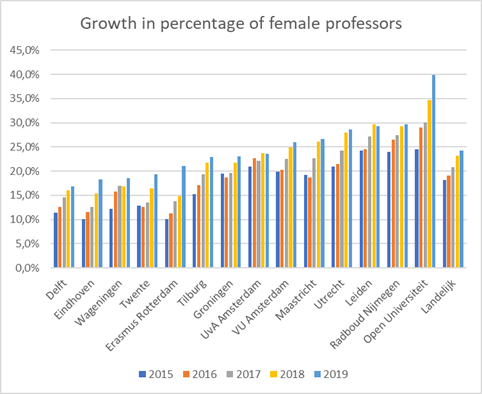Slower advancement of female professors
It may take until the year 2043 until there are as many female as male professors. The rapid increase in the number of female professors hired appears to have slowed down again. There was an increase at TU/e however, where the number of women professors grew with 2.9 percent in 2019 compared to last year. Only two other universities achieved a sharper increase: the University of Twente (3 percent) and Erasmus University Rotterdam (6.2 percent).
The growth of women in science recently appeared to be gaining momentum, as the percentage of female professors went up by more than two percentage points in 2018, an unprecedented increase. Almost one in four professors is now female.
However, this growth appeared to slow down last year, as shown in new staff figures provided by the universities. In 2019, there were 1.1 percentage points more female professors than in 2018: 24.3 percent to be exact.
At a growth rate of 1.1 percentage points per year, it will take 23 years before an even distribution between men and women in academia is achieved. Former Minister of Education Jet Bussemaker (PvdA) created a subsidy scheme in 2017, aimed at encouraging the hiring of more female professors. The scheme appeared to be working quite well. Without the financial stimulus, however, the appointment of female scientists is clearly slowing down.
At the University of Amsterdam and Leiden University, the percentage of female professors has even declined slightly, although Leiden is still near the top of the list.
Growth
The four universities of technology employ the fewest female professors. TU/e and the University of Twente, however, are the universities where the number of women professors rose far above the average last year: 2.9 percent at TU/e and 3 percent at the University of Twente. Erasmus University Rotterdam fared best with a 6.2 percent increase.
TU/e temporarily put its Irène Curie Fellowship program, which gives women priority when filling vacancies since July 2019, on hold this year. In July of this year, the Netherlands Institute for Human Rights ruled that it makes a direct distinction on the basis of gender when recruiting and selecting candidates. This is unlawful, according to the Institute, and it considered the ICF program too severe a means.
TU/e has by now submitted an amended version of its ICF program, and the Executive Board expects the Institute to issue a ruling on this so-called ‘request for a judgment on its actions’ in early 2021. Since the launch of the ICF program in July 2019, TU/e appointed six female and six male professors. There was a strong increase in the number of assistant professors (UD), with a ratio of male to female UD’s of 41 against 45.
On the lower rungs of the career ladder, the number of women is currently not rising any faster. Less than 30 percent of all associate professors are female: an increase of (again) 1.1 percentage points compared to the previous year. Among university lecturers the share of women was up by one-tenth to 42.6 percent.





Discussion